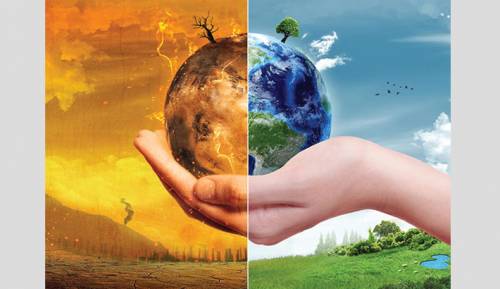Climate Change
‘We’ is the whole world now
by Abby Mohaupt

In September, the New York Times magazine released “Losing Earth: The Decade We Almost Solved Climate Change” by Nathaniel Rich. It’s 89 pages on climate change and what we could have done to stop it. It tackles the fossil fuel industry, environmental activism, and climatology in the 1980s. It explores how we ignored the prophetic witness of Dr. James Hansen and Rafe Pomerance (and others), which stretches into our contemporary denial and paralysis.
“Losing Earth” is a brutal reminder of what could have been. It is a powerful story of how we got to where we are. It took me days to read it; I needed to put it down to reflect.
To do so, I put on my running shoes and went out to the trail near my house in Northern California. I ran through the eucalyptus trees. Their unique smell wrapped around me, filling my lungs. I picked my way along the pot-holed road until I got to the stoplight that separates my town from the ocean. When the light changed. I dashed across the highway to the sea line.
Home: The Ocean
When my partner and I first moved here, I ran or walked this path nearly every day, learning the shape of the shore. Whenever I come, I take a picture of the same part of the coastline, its hills and crannies marked by the light of different times of day. But it’s the water that calls me —the never-ending rhythm of the waves, the crash and pull of the tides. Sometimes there are signs on the beach telling passersby to stay out of the water, but usually there are surfers and children braving the Pacific chill.
When we first moved here, I went every day to sit and listen to the ocean. I sat on the sand or on a boulder and read or wrote. But that first Thanksgiving, the county blocked off the beach and reinforced the retaining wall. They brought in more boulders to pile high. The king tides were getting stronger, and the ocean was threatening to take over the highway. Sea level rise (exacerbated by climate change) would cut off my town from the world if we didn’t respond. My sense of the “we” who lived in our town grew — not just my family but a whole town.
The sea is already rising.
When we first moved here, I thought that climate change was a phenomenon of the future, that we had time to change that we could still save ourselves. Now I run next to an ocean that is rising. “We” is the whole world now.
The Task Ahead
This month, the International Panel on Climate Change issued a report on just how little time we have to respond to climate change in order to keep the planet habitable in our lifetime. The report is devastatingly heartbreaking. It tells us we must keep global temperature increase to just 1.5 degrees Celsius or prepare to use technology to mitigate the ongoing effects of climate change.
Whatever we do now will have ripple effects into the long-term. Much of what we will do today and in the short term will do little to impact our lives and the lives of our children. Climate change is happening. Vulnerable peoples will be catastrophically affected. Those of us with (economic, racial, geographic) privilege will have more time before changing climate shatters our lives into pieces.
Still, my email inbox is full of stories from friends around the world who are already picking up the pieces. A friend from Florida is tired of flooding. Her emails are infused with anger at our denomination for continuing to make money from investments in the fossil fuel industry while that same industries profits from the rising seas. A friend from Nigeria shares his deep call to respond to the earth that has carried him, especially now that it needs him to carry it. His words are filled with compassion for those of us who think we have time, but his village has already been wiped from the map. A colleague from Indonesia writes about her family and friends after another hurricane, miraculously surviving increased winds and waves. She sends pictures — the world is already broken into pieces.
Sometimes I pick up rocks on my runs — pieces of the earth to carry with me for a while or to make a cairn along the path. I don’t know what we — those of us with economic, racial, geographic privileges — will do with what we understand about climate change. I know only that the rest of us—the parts of the body of Christ who live on the front lines — are waiting.
abby mohaupt (yes, lower cap, that is correct…writer’s preference) is the moderator of Fossil Free PC(U.S.A.), a PhD student at Drew University in Madison, New Jersey, and a minister member of San Francisco Presbytery. She’s is a partner, daughter, aunt and sister, as well as a long distance runner and artist.